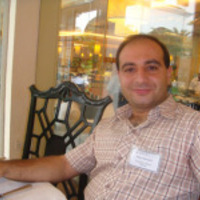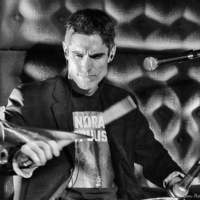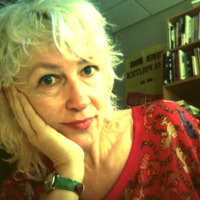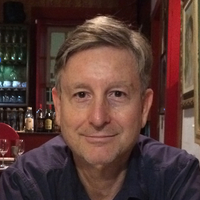Louis Dufort
Related Authors
Vinicius Garcia
Universidade Federal de Pernambuco
Katherine Butler Schofield
King's College London
Iman Attarzadeh
Islamic Azad University of Tehran, Central branch
Gareth Dylan D Smith
Boston University
Claire Bishop
Graduate Center of the City University of New York
Egil Bakka
Norwegian University of Science and Technology
Javier Marín-López
Universidad de Jaén
George Sampatakakis
University of Patras
Paulo Castagna
Universidade Estadual Paulista "Júlio de Mesquita Filho"
Viacheslav Kuleshov
Stockholm University









Uploads
Papers by Louis Dufort
Cette thèse est une exploration de mon processus compositionnel. En tentant de
comprendre comment s’organise ma pensée créatrice, j’ai dégagé trois observations :
l’organicisme du processus et des oeuvres, la notion de mouvement et la relation récursive
entre la matière et le compositeur. Ces thèmes m’ont amené à établir un lien épistémologique
entre la composition musicale et l’étude des systèmes complexes. Dans ce cadre systémique,
j’ai établi que les informations qui motivent mes prises de décision artistiques ont entre elles
des ramifications opérationnelles et structurelles qui évoquent une arborescence rhizomatique
plutôt qu’une hiérarchie linéaire.
La transdisciplinarité propre à la systémique m’a également permis d’introduire des
notions provenant d’autres champs de recherche. S’articulant d’emblée avec mon processus
compositionnel, ces notions m’ont procuré une vision holistique de ma démarche artistique.
Conséquemment, je considère l’acte de composer comme une interaction entre ma conscience
et tout ce qui peut émaner de la matière sonore, les deux s’informant l’une et l’autre dans une
boucle récursive que je nomme action⟳perception. L’oeuvre ainsi produite n’est pas
exclusivement tributaire de ma propre volition puisque, au fil du processus, mes décisions
opératoires et artistiques sont en grande partie guidées par les propriétés invariantes et les
propriétés morphogéniques inhérentes au matériau sonore. Cette approche dynamique n’est
possible que si l’interaction avec le compositeur se fait en temps réel, ce que permet la lutherie
numérique. Les résultats de mes recherches m’ont guidé dans la composition d’oeuvres
choisies, autant acousmatiques, mixtes, vidéomusicales que pluridisciplinaires.
Mots-clés : Composition, systémique, acousmatique, vidéomusique, musique mixte,
pluridisciplinaire, interaction, temps réel, numérique, granulation audio.
Abstract
This thesis is an exploration of the poietic foundation of my compositional process. As
I tried to understand how my creative thinking strutures itself, I came upon three themes: the
organicism of my process and work, the notion of movement and the recursive relationship
between composer and material. These themes lead me to draw an epistemological parallel
between musical composition and the study of complex systems. Within this systemic
framework, it was ascertained that the information that motivates my artistic decision-making
are operationally and structurally ramified in a way that evokes a rhizomatic arborescence
rather than a linear hierarchy.
The transdisciplinarity characteristic of systemics also helped introduce notions from
other fields of research. Readily articulating themselves with my compositional process, these
notions militated in favor of a holistic view of my artistic practice. The act of composing is
thereby construed as the interlinking of my conscience and the sound material, the two
influencing one another through a recursive loop labeled action⟳perception. The work thus
composed is not the exclusive tributary of my own volition since over the length of the process
my artistic and operational decisions are to a great extent guided by both the invariant and
morphogenic properties inherent to the sound material. This dynamic approach is only
possible if the interaction with the composer is made in real time, something that the digital
instruments allows. The results of my research guided me in the composition of chosen
works – acousmatic, mixed, videomusical and pluridisciplinary.
Cette thèse est une exploration de mon processus compositionnel. En tentant de
comprendre comment s’organise ma pensée créatrice, j’ai dégagé trois observations :
l’organicisme du processus et des oeuvres, la notion de mouvement et la relation récursive
entre la matière et le compositeur. Ces thèmes m’ont amené à établir un lien épistémologique
entre la composition musicale et l’étude des systèmes complexes. Dans ce cadre systémique,
j’ai établi que les informations qui motivent mes prises de décision artistiques ont entre elles
des ramifications opérationnelles et structurelles qui évoquent une arborescence rhizomatique
plutôt qu’une hiérarchie linéaire.
La transdisciplinarité propre à la systémique m’a également permis d’introduire des
notions provenant d’autres champs de recherche. S’articulant d’emblée avec mon processus
compositionnel, ces notions m’ont procuré une vision holistique de ma démarche artistique.
Conséquemment, je considère l’acte de composer comme une interaction entre ma conscience
et tout ce qui peut émaner de la matière sonore, les deux s’informant l’une et l’autre dans une
boucle récursive que je nomme action⟳perception. L’oeuvre ainsi produite n’est pas
exclusivement tributaire de ma propre volition puisque, au fil du processus, mes décisions
opératoires et artistiques sont en grande partie guidées par les propriétés invariantes et les
propriétés morphogéniques inhérentes au matériau sonore. Cette approche dynamique n’est
possible que si l’interaction avec le compositeur se fait en temps réel, ce que permet la lutherie
numérique. Les résultats de mes recherches m’ont guidé dans la composition d’oeuvres
choisies, autant acousmatiques, mixtes, vidéomusicales que pluridisciplinaires.
Mots-clés : Composition, systémique, acousmatique, vidéomusique, musique mixte,
pluridisciplinaire, interaction, temps réel, numérique, granulation audio.
Abstract
This thesis is an exploration of the poietic foundation of my compositional process. As
I tried to understand how my creative thinking strutures itself, I came upon three themes: the
organicism of my process and work, the notion of movement and the recursive relationship
between composer and material. These themes lead me to draw an epistemological parallel
between musical composition and the study of complex systems. Within this systemic
framework, it was ascertained that the information that motivates my artistic decision-making
are operationally and structurally ramified in a way that evokes a rhizomatic arborescence
rather than a linear hierarchy.
The transdisciplinarity characteristic of systemics also helped introduce notions from
other fields of research. Readily articulating themselves with my compositional process, these
notions militated in favor of a holistic view of my artistic practice. The act of composing is
thereby construed as the interlinking of my conscience and the sound material, the two
influencing one another through a recursive loop labeled action⟳perception. The work thus
composed is not the exclusive tributary of my own volition since over the length of the process
my artistic and operational decisions are to a great extent guided by both the invariant and
morphogenic properties inherent to the sound material. This dynamic approach is only
possible if the interaction with the composer is made in real time, something that the digital
instruments allows. The results of my research guided me in the composition of chosen
works – acousmatic, mixed, videomusical and pluridisciplinary.